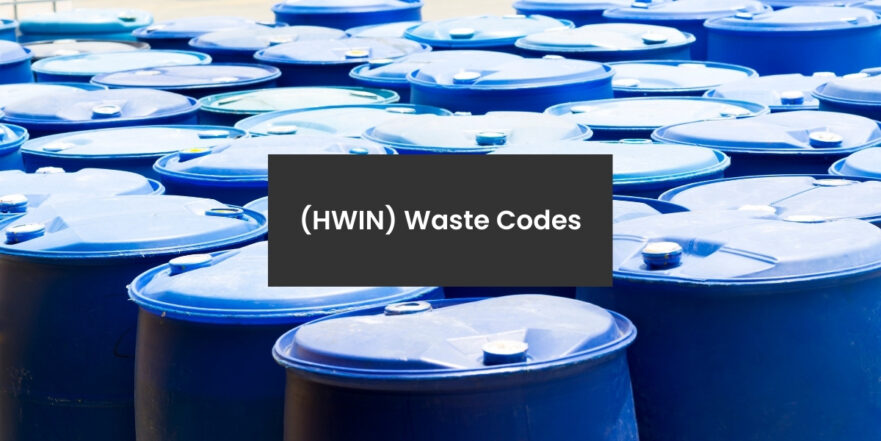Hazardous Waste Information Network, known as HWIN, was a system used by the Canadian government to keep track of waste management activities. This includes reporting the amount and type of waste, transportation methods used, and the location of disposal. HWIN is no longer being used, and the new system is HWP (Hazardous Waste Program) from the Resource Productivity and Resource Authority or RPRA.
The government regulates waste management to maintain environmental quality standards and prevent pollution, greenhouse gas emissions, and land destruction.
When disposing of waste, individuals and companies are required to indicate the waste type using a specific set of numbers and the letter W, known as waste codes. These codes help identify the type of solvent waste being disposed of, and there are hundreds of different types of waste codes, as each solvent type can be broken down into different segments.
HWIN Solvent Waste Codes
Solvent waste codes vary from location to location, as different provinces may have different waste codes for the same solvent waste. In Ontario, the most popular waste classifications are alkaline solutions, aqueous salts, non-halogenated solvents, and natural gases.
Here is an example list of solvent waste codes and their descriptions:
Acid Solutions (110s):
- Spent pickle liquor (W111): Acid solutions of sulphuric and hydrochloric acids containing ferrous salts from steel pickling.
- Acid solutions, sludges and residues containing heavy metals (W112): Solutions of sulphuric, hydrochloric, and nitric acids containing copper, nickel, zinc, and more.
- Other inorganic Acid Wastes (W114): Off-specification acids.
Alkaline Solutions (120s):
- Alkaline Solutions, sludges and residues containing heavy metals (W121): Metal finishing wastes.
- Alkaline Solutions, sludges and residues containing other metals and non-metals, not containing cyanides (W122): Alkaline solutions from aluminum surface coating and etching.
- Alkaline Phosphates (W123): Bonderizing wastes.
Aqueous Salts (130s):
- Neutralized solutions, sludges and residues containing heavy metals (W131): Metal finishing waste treatment containing copper, nickel, zinc, and more.
- Neutralized solutions sludges and residues containing other metals (W132): Aluminum surface coating treatment sludges; alum and gypsum sludges.
- Wastes containing sulphides (W134): petroleum aqueous refinery condensates.
The Importance of Waste Codes
Waste codes are essential in regulating waste management activities, as certain solvents cannot be disposed of in high volume amounts due to their chemical contaminants, which can have a negative impact on the environment. However, other wastes can be disposed of at higher volumes because they are less hazardous than other materials.
The Potential Expansion of Waste Codes
Waste codes are continually expanding as the solvent industry innovates and creates new solvents for everyday manufacturing. New solvents require new waste codes to be created, as they create new waste. The Ontario waste classifications are constantly being updated to keep up with new solvents and waste classifications to maintain environmental sustainability.
Maratek’s Waste Management
Maratek provides recycling and disposal services for individuals and companies. Maratek offers full transportation, disposal, and proper protocol services, which can be completed in six easy steps and a 30-day or sooner pickup.
Maratek’s solvent management team provides quick, reliable, and efficient services for all solvent disposal services. The six steps are as follows:
- Request a definition of liquid waste or solvent to understand the best approach to recycling.
- Identify the waste as a transportable waste under the Ministry of Environment, Conservation, and Parks.
- Sample the waste using a distillation process to separate the components of waste from the recoverable solvents.
- If deemed recyclable, schedule a pickup within 30 days. The solvent handling process will begin, and Maratek will deliver the solvent to its facility.
- Depending on the unit, Maratek will use the appropriate recovering machine to efficiently recover all the potential salvageable solvents from the waste.
- If the waste is deemed as disposable, Maratek will schedule the pickup within 30 days and begin a thermal decomposition process to eliminate the waste safely.
Interested in learning more about Maratek’s recycling and disposal services? Request a quote today.

